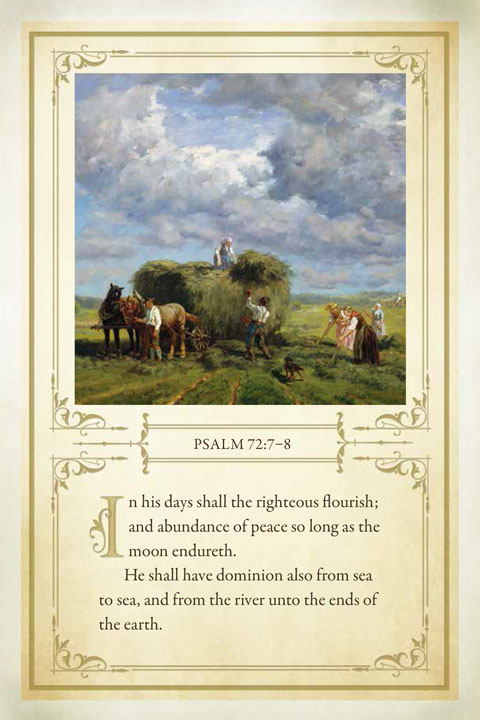
Psalm 72

Give the king thy judgments, O God, and thy righteousness unto the king’s son.
He shall judge thy people with righteousness, and thy poor with judgment. . . .
He shall judge the poor of the people, he shall save the children of the needy, and shall break in pieces the oppressor. . . .
In his days shall the righteous flourish; and abundance of peace so long as the moon endureth.
He shall have dominion also from sea to sea, and from the river unto the ends of the earth.
They that dwell in the wilderness shall bow before him; and his enemies shall lick the dust. . . .
Yea, all kings shall fall down before him: all nations shall serve him.
For he shall deliver the needy when he crieth; the poor also, and him that hath no helper.
He shall spare the poor and needy, and shall save the souls of the needy.
He shall redeem their soul from deceit and violence: and precious shall their blood be in his sight. . . .
His name shall endure for ever: his name shall be continued as long as the sun: and men shall be blessed in him: all nations shall call him blessed.
Blessed be the Lord God, the God of Israel, who only doeth wondrous things.
And blessed be his glorious name for ever: and let the whole earth be filled with his glory; Amen, and Amen.
This psalm is preeminent among a select few in the book for at least two reasons: First, it is one of the unknown number of psalms that we can assume really were written by David, and second, it demonstrates how the adoration of and supplication for an earthly king—in this case David’s son Solomon—moves that earthly figure into a type or prefiguration of Christ, the Heavenly King. Many of the psalms fall into this category, with application both to mortal beings living in the immediate circumstance and to heavenly beings dwelling in eternity, but none of them demonstrate this literary and theological turn more clearly than does Psalm 72.
Note how the first line introduces this dual meaning and double level of reading in very few words. Clearly this introductory line is an appeal to God by “the king” (David) on behalf of “the king’s son” (Solomon), but see how easily the reader is led to see this as typological, with God as “the king” and Jesus as “the king’s son,” especially when the word “judgments” is associated with the former and “righteousness” with the latter—traditional biblical characterizations of the Father and the Son.
With that introduction so skillfully laid as foundation, it is almost impossible not to see Christ in the imagery for and about Solomon that follows: He will judge all with “righteousness,” but he will be especially mindful of “the poor” and “the needy.” Under His rule “shall the righteous flourish” and there shall be an “abundance of peace” eternally (“so long as the moon endureth”). His dominion shall be global and His rule universal, “from sea to sea, and from the river unto the ends of the earth.” Again special mention is made of the poor: “He shall deliver the needy when he crieth; the poor also, and him that hath no helper.” And His deliverance will be spiritual as well as temporal. In sparing the poor in their economic plight, He will also “save the souls of the needy,” redeeming them from deceit and violence, certainly two of the ancillary ills that so often accompany poverty. “Precious shall their blood be in his sight.”
The psalm seems to move completely from earthly king to Heavenly King in its concluding verses. The imagery of Christ and His millennial reign is intentional:
His name shall endure for ever: his name shall be continued as long as the sun: and men shall be blessed in him: all nations shall call him blessed.
Blessed be the Lord God, the God of Israel, who only doeth wondrous things.
And blessed be his glorious name for ever: and let the whole earth be filled with his glory; Amen, and Amen.
Some scholars believe—and the text would seem to indicate—that this may be the last of David’s canonized psalms.227 Whether it is or isn’t, we can certainly say that it is one of the most Messianic of his psalms and in that regard could certainly serve well as a valedictory declaration regarding the Son of God who would one day come with the additional title of Son of David.228

PSALM 72:7-8
Harvesting Day by Desire Thomassin.
3LH-Fine Art/SuperStock/Getty Images.
Notes